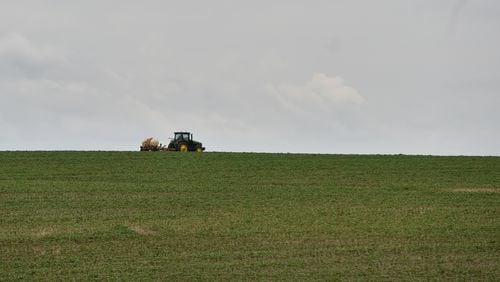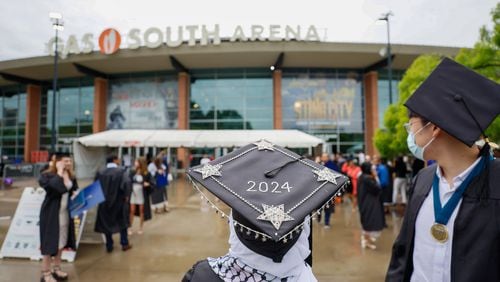Many victims of a large-scale South Georgia labor trafficking ring regained their freedom on the same day: Nov. 17, 2021. On that Wednesday, law enforcement rescued 26 migrant farmworkers from the living quarters they were held in and took them to a victims’ center set up in Douglas, a town of 12,000 in rural Coffee County.
There, a team of government workers, paralegals, medical personnel and social services providers were on hand to help the workers through just the first stage of a recovery process that can stretch for years.
For victims, the aftermath of a trafficking bust is a delicate time. They must rely on immigration authorities or nonprofit advocacy groups to ensure they keep legal status in this country and have the resources they need to survive. But they also need help coping with their trauma.
“What often happens is that they’re going to take the next job, which could be as abusive as the one that they just escaped, where they are going to become victims again of wage theft and abuse,” said Victoria Mesa-Estrada, a senior staff attorney at the Southern Poverty Law Center. “And the cycle just keeps going, because this is a population that is very vulnerable to abuse.”
In Douglas, the initial priority for case workers was to assess victims’ physical health. Rescued farmworkers arrived at the victims’ center with cuts, bruises and infections caused by work conditions that prosecutors would go on to describe as akin to “modern-day slavery” in an indictment unsealed later in November. The victims were migrants from Latin America who came to Georgia with legal visas before being allegedly abused by their employers.
Workers were “lucky to get a meal a day,” said Alia El-Sawi, an Atlanta-based victim assistance specialist at Homeland Security Investigations (HSI), the agency within the Department of Homeland Security that led the years-long investigation into the South Georgia trafficking ring, and which also took the lead in setting up the Douglas facility. “A lot of people wouldn’t have their pets living that way.”
At the victims’ center, workers had access to COVID-19 tests, food, toiletries and clothing. They were able to make calls to families and friends to let them know that they were safe. Staff from the Georgia Legal Services Program were also on site to review legal remedies available to workers. Representatives from Tapestri, a Georgia nonprofit that helps trafficking victims find shelter and counseling, among other services, were also on hand.
Authorities’ investigation into the criminal enterprise that allegedly exploited the farmworkers is still ongoing. As firsthand witnesses, many of the people rescued Nov. 17 will likely be called on to cooperate with investigators. But El-Sawi said in-depth interviews with workers are saved for later, to avoid “retraumatizing” victims so soon after being rescued.
At the Douglas facility, HSI began work to file for “continued presence,” a two-year-long immigration status for victims of human trafficking.
“We are trying to take a victim-centric, holistic approach, making sure that all their needs are met,” El-Sawi said.
Laura Germino is a co-founder of the Coalition of Immokalee Workers. The Florida-based nonprofit’s Anti-Slavery Program has assisted in the prosecution of several farm slavery operations across the southeastern U.S. since the 1990s, helping liberate over 1,200 workers.
Farmworkers “go from suffering a loss of control when they’re in one of these situations to, once freed, they regain control, but it doesn’t happen just like that,” she said. “It’s not instant because of what people have been through.”
Germino remembers the remarks a man caught in an abusive job in Florida made following his release: “He said it’s like coming out of the darkness into the light. He said it’s like being reborn.”
‘Permanent damage’
Experts say that one of the immediate objectives of farmworkers freed from forced labor operations is to waste no time getting back to work. That’s because they are cash-strapped, with wage theft being a common crime against trafficking victims, including, allegedly, in the South Georgia “modern-day slavery” case.
“One of the first things workers desperately want is a job when they get out, because they have not been earning the money that they wanted to earn to support their families,” Germino said.
Compounding the urgency, many migrant farmworkers take out loans to pay their travel costs to come to the U.S. Returning home without having paid lenders back could expose workers to danger.
“They are [stuck] between a rock and a hard place,” said Solimar Mercado-Spencer, senior staff attorney at the Georgia Legal Services Program’s Farmworker Rights Division.
Continued presence, the temporary parole status that law enforcement can request for foreign-born trafficking victims, allows recipients to obtain a work permit “We want [victims] to be able to work as soon as possible,” El-Sawi, from Homeland Security Investigations, said.
So does a T visa, a more permanent type of immigration benefit.
T visas provide legal status to victims of a “severe form” of human trafficking, a designation that, according to Mercado-Spencer, includes forced labor. Migrants who successfully apply to the U.S. Citizenship and Immigration Services for T visa status may petition for relatives in their home country to join them in the U.S. Some may eventually qualify for permanent residency (a green card) and, eventually, citizenship.
But immigration relief for trafficking victims isn’t immediate. The processing time for T visa applications can stretch longer than a year. And according to El-Sawi, it can take up to two months for continued presence status to be approved. Those wait times could leave victims in jeopardy of losing legal status in the U.S., especially for those who came to the country, as did the South Georgia victims, through the H-2A program, a temporary visa for seasonal agricultural labor. H-2A visas are valid only for months at a time, and they are tied to the employer who sponsored the workers. That means that some victims could become undocumented — and potentially face deportation — in the time it takes for continued presence or a T visa to come through.
“Oftentimes, they’re just left there waiting,” Mesa-Estrada said. “It’s a very problematic system.”
Instead of attempting to avail themselves of services available in the U.S., some victims may choose to go back to their home countries, something local nonprofits and consular authorities can help coordinate.
Regardless of the decisions they make, Mercado-Spencer says workers who were once trapped in conditions like those described by authorities in South Georgia will likely be marked by the experience for a long time.
“There is permanent damage. There is trauma,” she said. “Some of them have been subjected to really terrible things.”
Lautaro Grinspan is a Report for America corps member covering metro Atlanta’s immigrant communities.
About the Author







